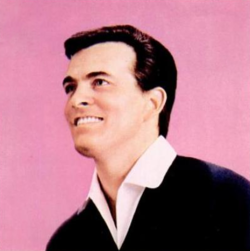The Best of Ronnie Dove Volume 2
| Ronnie Dove | |
|---|---|

Ronnie Dove in 1966
|
|
| Background information | |
| Birth name | Ronald Eugene Dove |
| Born |
September 7, 1935 Herndon, Virginia, United States |
| Genres | Pop, country |
| Occupation(s) | Singer, songwriter, producer |
| Years active | 1959–1989, 1991–present |
| Labels | Diamond Records, Decca Records, Certron Records, MCA Records, Hobby Records, Melodyland Records |
| Associated acts | Johnny Thunder (singer) |
| Website | http://www.ronniedove.com http://ronniedovemusic.com |
Ronnie Dove (born September 7, 1935) is an American pop and country musician who had a string of hit pop records in the mid to late 1960's and several country chart records in the 70's and 80's.
Ronnie Dove, the only son of Fairfax County, Virginia police sergeant Paul S. Dove and his first wife, Catherine Pearl nee Smith Dove Rusk, was born in Herndon, Virginia, his older sister is Marjorie L. Forrester. During his stint in the Coast Guard, Dove began his singing career in the clubs of Baltimore, where he was stationed. He formed a group, The Belltones, and they played Baltimore and the East Coast for four years. In 1959, they recorded their debut single "Lover Boy" as well as a cover of the Buddy Knox hit "Party Doll" before Dove went solo with Diamond Records. His first solo single, "Sweeter Than Sugar" appeared in 1964 to no fanfare. Later that year "Say You" was released and earned Dove his first chart record. The next single, a cover of Wanda Jackson's "Right Or Wrong," put him into the Top 20. In 1965, he had 5 chart singles and after just three albums Diamond Records released a "best of" collection. His name was featured many times in both Billboard and Cashbox awards in 1965.
More hits came in 1966 and 1967 including "My Babe", "Cry", "Happy Summer Days" and others. In 1966, he began hosting a local television show in Baltimore called "The Ronnie Dove Show". It lasted for 13 episodes. Today, only 2 episodes survive. When Diamond closed in 1970, he moved, briefly, to Aubrey Mayhew's Certron Records. Shortly thereafter, he went to the independent Wrayco Records and released a Bobby Hebb cover of "Sunny". He then signed a new deal with Decca Records in 1971 and pointed his career in a more country oriented direction, scoring two minor country chart hits and an album. After this, he moved to the Motown country label Melodyland and had a top 40 country hit. During this period, he recorded two albums of country music, but neither ended up being released. Although he moved to some smaller, independent labels throughout the rest of the 1970s he still continued to record. He opened his own club in Baltimore and his fans were able to see him perform through the 1980s. He briefly revived the Diamond record label in 1987 to release a couple of singles and an album. These two singles managed to reach the lower rungs of Billboard's Country charts.
...
Wikipedia
